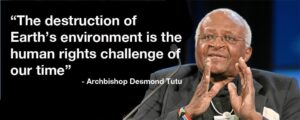.
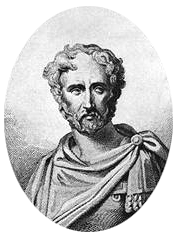 Naturalis Historia by Pliny the Elder, ACE 77–79. “I have included in thirty-six books 20,000 topics, all worthy of attention…” Pliny says in the introduction. These cover topics including geography, anthropology, zoology, botany, agriculture and mining. “The nature of the animated beings which exist upon [the world], is hardly in any degree less worthy of our contemplation than its other features; if, indeed, the human mind is able to embrace the whole of so diversified a subject.” In Chapter 34, Pliny writes about the influence of the environment on animals: “Africa and Egypt produce wolves of a sluggish and stunted nature;those of the colder climates are fierce and savage. That men have been turned into wolves, and again restored to their original form, we must confidently look upon as untrue, unless, indeed, we are ready to believe all the tales, which, for so many ages, have been found to be fabulous.” Naturalis Historia by Pliny the Elder, ACE 77–79. “I have included in thirty-six books 20,000 topics, all worthy of attention…” Pliny says in the introduction. These cover topics including geography, anthropology, zoology, botany, agriculture and mining. “The nature of the animated beings which exist upon [the world], is hardly in any degree less worthy of our contemplation than its other features; if, indeed, the human mind is able to embrace the whole of so diversified a subject.” In Chapter 34, Pliny writes about the influence of the environment on animals: “Africa and Egypt produce wolves of a sluggish and stunted nature;those of the colder climates are fierce and savage. That men have been turned into wolves, and again restored to their original form, we must confidently look upon as untrue, unless, indeed, we are ready to believe all the tales, which, for so many ages, have been found to be fabulous.” |
| Systema Naturae by Carolus Linnaeus, 1735 — Swedish scientist Linnaeus conceived the modern system of biological and zoological nomenclature based on Aristotle’s idea of a Great Chain of Being. “O Jehova! Quom magifica sunt Tuo Opera!” (p. 4) |
| Nature by Ralph Waldo Emerson, 1838 –A nobler want of man is served by nature, namely, the love of Beauty. |
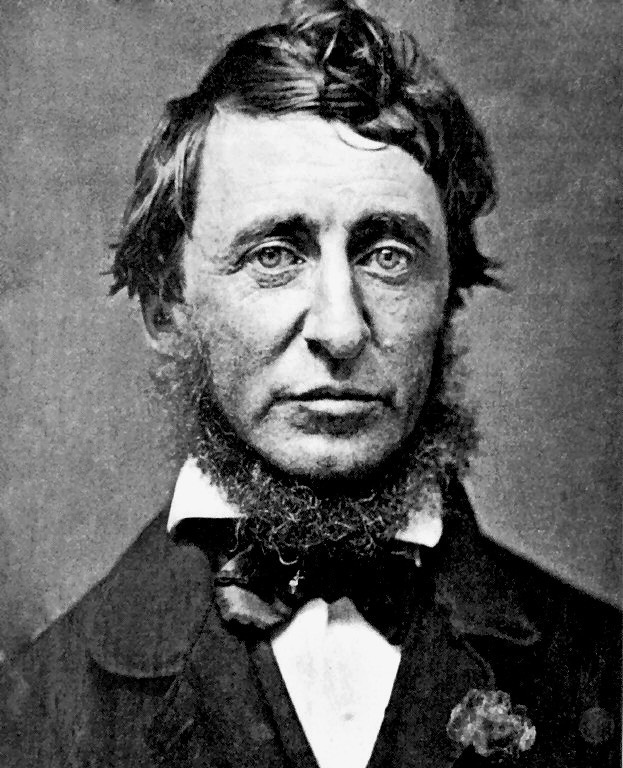 Walden by Henry David Thoreau, 1854 – “I went to the woods because I wished to live deliberately, to front only the essential facts of life, and see if I could not learn what it had to teach, and not, when I came to die, discover that I had not lived. I did not wish to live what was not life, living is so dear; nor did I wish to practice resignation, unless it was quite necessary. I wanted to live deep and suck out all the marrow of life, to live so sturdily and Spartan-like as to put to rout all that was not life, to cut a broad swath and shave close, to drive life into a corner, and reduce it to its lowest terms, and, if it proved to be mean, why then to get the whole and genuine meanness of it, and publish its meanness to the world; or if it were sublime, to know it by experience, and be able to give a true account of it in my next excursion. For most men, it appears to me, are in a strange uncertainty about it, whether it is of the devil or of God, and have somewhat hastily concluded that it is the chief end of man here to “glorify God and enjoy him forever…. Walden by Henry David Thoreau, 1854 – “I went to the woods because I wished to live deliberately, to front only the essential facts of life, and see if I could not learn what it had to teach, and not, when I came to die, discover that I had not lived. I did not wish to live what was not life, living is so dear; nor did I wish to practice resignation, unless it was quite necessary. I wanted to live deep and suck out all the marrow of life, to live so sturdily and Spartan-like as to put to rout all that was not life, to cut a broad swath and shave close, to drive life into a corner, and reduce it to its lowest terms, and, if it proved to be mean, why then to get the whole and genuine meanness of it, and publish its meanness to the world; or if it were sublime, to know it by experience, and be able to give a true account of it in my next excursion. For most men, it appears to me, are in a strange uncertainty about it, whether it is of the devil or of God, and have somewhat hastily concluded that it is the chief end of man here to “glorify God and enjoy him forever….“We are in great haste to construct a magnetic telegraph from Maine to Texas; but Maine and Texas, it may be, have nothing important to communicate. Either is in such a predicament as the man who was earnest to be introduced to a distinguished deaf woman, but when he was presented, and one end of her ear trumpet was put into his hand, had nothing to say. As if the main object were to talk fast and not to talk sensibly. We are eager to tunnel under the Atlantic and bring the old world some weeks nearer to the new; but perchance the first news that will leak through into the broad, flapping American ear will be that the Princess Adelaide has the whooping cough.” |
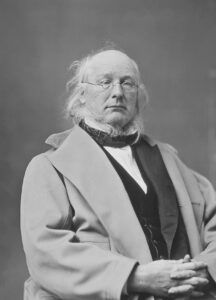 An Overland Journey from New York to San Francisco – Horace Greeley, 1859. Chapter VII, Last of the Buffalo, Reisinger’s Creek, Station No. 13, Pike’s Peak Express Company, May 31, 1859. “All day yesterday, they darkened the earth around us, often seeming to be drawn up like an army in battle array on the ridges and down their slopes a mile or so south of us … What strikes the stranger with most amazement is their immense numbers. I know a million is a great many, but I am confident we saw that number yesterday. Certainly, all we saw could not have stood on tine square miles of ground. Often, the country for miles on either hand seemed quite black with them. The soil is rich, and well matted with their favorite grass. Yet it is all eaten down … like an overtaxed sheep-pasture in a dry August.” An Overland Journey from New York to San Francisco – Horace Greeley, 1859. Chapter VII, Last of the Buffalo, Reisinger’s Creek, Station No. 13, Pike’s Peak Express Company, May 31, 1859. “All day yesterday, they darkened the earth around us, often seeming to be drawn up like an army in battle array on the ridges and down their slopes a mile or so south of us … What strikes the stranger with most amazement is their immense numbers. I know a million is a great many, but I am confident we saw that number yesterday. Certainly, all we saw could not have stood on tine square miles of ground. Often, the country for miles on either hand seemed quite black with them. The soil is rich, and well matted with their favorite grass. Yet it is all eaten down … like an overtaxed sheep-pasture in a dry August.” |
| Man and Nature by George Perkins Marsh, 1867 — “Vast forests have disappeared from mountain spurs and ridges; the vegetable earth accumulated beneath the trees by the decay of leaves and fallen trunks, the soil of the alpine pastures which skirted and indented the woods, and the mould of the upland fields, are washed away; meadows, once fertilized by irrigation, are waste and unproductive, because the cisterns and reservoirs that supplied the ancient canals are broken, or the springs that fed them dried up; rivers famous in history and song have shrunk to humble brooklets…” |
 A White Heron by Sarah Orne Jewett, 1868 — “… You would know the heron if you saw it,” the stranger continued eagerly. “A queer tall white bird with soft feathers and long thin legs. And it would have a nest perhaps in the top of a high tree, made of sticks, something like a hawk’s nest.” Sylvia’s heart gave a wild beat; she knew that strange white bird, and had once stolen softly near where it stood in some bright green swamp grass, away over at the other side of the woods. There was an open place where the sunshine always seemed strangely yellow and hot, where tall, nodding rushes grew, and her grandmother had warned her that she might sink in the soft black mud underneath and never be heard of more. Not far beyond were the salt marshes just this side the sea itself, which Sylvia wondered and dreamed much about, but never had seen, whose great voice could sometimes be heard above the noise of the woods on stormy nights. A White Heron by Sarah Orne Jewett, 1868 — “… You would know the heron if you saw it,” the stranger continued eagerly. “A queer tall white bird with soft feathers and long thin legs. And it would have a nest perhaps in the top of a high tree, made of sticks, something like a hawk’s nest.” Sylvia’s heart gave a wild beat; she knew that strange white bird, and had once stolen softly near where it stood in some bright green swamp grass, away over at the other side of the woods. There was an open place where the sunshine always seemed strangely yellow and hot, where tall, nodding rushes grew, and her grandmother had warned her that she might sink in the soft black mud underneath and never be heard of more. Not far beyond were the salt marshes just this side the sea itself, which Sylvia wondered and dreamed much about, but never had seen, whose great voice could sometimes be heard above the noise of the woods on stormy nights.“I can’t think of anything I should like so much as to find that heron’s nest,” the handsome stranger was saying. “I would give ten dollars to anybody who could show it to me,” he added desperately, “and I mean to spend my whole vacation hunting for it if need be. Perhaps it was only migrating, or had been chased out of its own region by some bird of prey… The next day the young sportsman hovered about the woods, and Sylvia kept him company, having lost her first fear of the friendly lad, who proved to be most kind and sympathetic. He told her many things about the birds and what they knew and where they lived and what they did with themselves. And he gave her a jack-knife, which she thought as great a treasure as if she were a desert-islander. All day long he did not once make her troubled or afraid except when he brought down some unsuspecting singing creature from its bough. Sylvia would have liked him vastly better without his gun; she could not understand why he killed the very birds he seemed to like so much… “ |
| Darwinism: An exposition of the Theory of Natural Selection by Alfred Russel Wallace, 1891 — “In order to appreciate fully the aim and object of this (Darwin’s) work… it is necessary to form a clear conception of the meaning of the term ‘species’ … and to understand what he meant … by discovering their ‘origin.’ It is for want of this preliminary knowledge that the majority of educated persons who are not naturalists are so ready to accept the innumerable objections, criticism and difficulties of its opponents as proofs that the Darwinian theory is unsound, while it also renders them unable to appreciate, or even to comprehend, the vast change which that theory has effected in the whole mass of thought and opinion on the question of evolution.” |
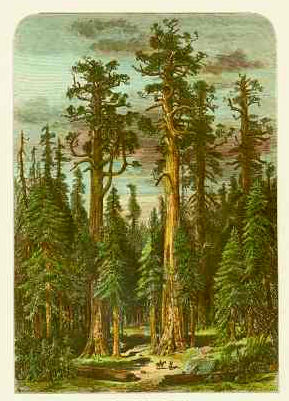 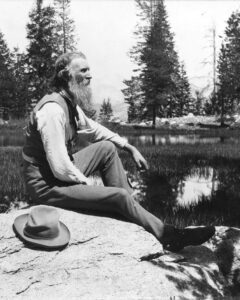 The Yosemite, by John Muir. 1912. “So harmonious and finely balanced are even the mightiest of these monarchs (giant sequoias) in all their proportions that there is never anything overgrown or monstrous about them. Seeing them for the first time you are more impressed with their beauty than their size, their grandeur being in great part invisible; but sooner or later it becomes manifest to the loving eye, stealing slowly on the senses like the grandeur of Niagara or of the Yosemite Domes. When you approach them and walk around them you begin to wonder at their colossal size and try to measure them…” On their exploitation, Muir wrote: “For every grove cut down, a stream is dried up. Therefore all California is crying, ‘Save the trees of the fountains.’ Nor, judging by the signs of the times, is it likely that the cry will cease until the salvation of all that is left of Sequoia gigantea is made sure.” The Yosemite, by John Muir. 1912. “So harmonious and finely balanced are even the mightiest of these monarchs (giant sequoias) in all their proportions that there is never anything overgrown or monstrous about them. Seeing them for the first time you are more impressed with their beauty than their size, their grandeur being in great part invisible; but sooner or later it becomes manifest to the loving eye, stealing slowly on the senses like the grandeur of Niagara or of the Yosemite Domes. When you approach them and walk around them you begin to wonder at their colossal size and try to measure them…” On their exploitation, Muir wrote: “For every grove cut down, a stream is dried up. Therefore all California is crying, ‘Save the trees of the fountains.’ Nor, judging by the signs of the times, is it likely that the cry will cease until the salvation of all that is left of Sequoia gigantea is made sure.” |
| Our Vanishing Wildlife – William T. Hornaday, 1913 – “For educated, civilized Man to exterminate a valuable wild species of living things is a crime. It is a crime against his own children, and posterity. No man has a right, either moral or legal, to destroy or squander an inheritance of his children that he holds for them in trust.” |
 The Poisonous Occupations in Illinois by Alice Hamilton. “We were staggered by the complexity of the problem we faced (in 1910) … The Factory Inspector’s office was blissfully ignorant, yet that was the only governmental body concerned with working conditions. There was nothing to do but begin with trades we knew were dangerous and hope that, as we studied them, we would discover others less well known… We learned about phossy jaw almost as soon as Europe did. The first recognized case was described by Lorinser of Vienna in 1845; the first American case was treated in the Massachusetts General Hospital only six years later, in 1851. But while all over continental Europe and England there was eager discussion of this new disease, many cases were reported and all sorts of preventive measures proposed, practically nothing was published in American medical journals from 1851 to 1909, both laymen and public health authorities contenting themselves with the assurance that all was well… “(from Exploring the Dangerous Trades, 1943). The Poisonous Occupations in Illinois by Alice Hamilton. “We were staggered by the complexity of the problem we faced (in 1910) … The Factory Inspector’s office was blissfully ignorant, yet that was the only governmental body concerned with working conditions. There was nothing to do but begin with trades we knew were dangerous and hope that, as we studied them, we would discover others less well known… We learned about phossy jaw almost as soon as Europe did. The first recognized case was described by Lorinser of Vienna in 1845; the first American case was treated in the Massachusetts General Hospital only six years later, in 1851. But while all over continental Europe and England there was eager discussion of this new disease, many cases were reported and all sorts of preventive measures proposed, practically nothing was published in American medical journals from 1851 to 1909, both laymen and public health authorities contenting themselves with the assurance that all was well… “(from Exploring the Dangerous Trades, 1943). |
 Politics and the English Language by George Orwell, 1946. “In our time it is broadly true that political writing is bad writing. Where it is not true, it will generally be found that the writer is some kind of rebel, expressing his private opinions and not a “party line.” Orthodoxy, of whatever color, seems to demand a lifeless, imitative style… Political language — and with variations this is true of all political parties, from Conservatives to Anarchists — is designed to make lies sound truthful and murder respectable, and to give an appearance of solidity to pure wind. One cannot change this all in a moment, but one can at least change one’s own habits, and from time to time one can even, if one jeers loudly enough, send some worn-out and useless phrase — some jackboot, Achilles’ heel, hotbed, melting pot, acid test, veritable inferno, or other lump of verbal refuse — into the dustbin, where it belongs. Politics and the English Language by George Orwell, 1946. “In our time it is broadly true that political writing is bad writing. Where it is not true, it will generally be found that the writer is some kind of rebel, expressing his private opinions and not a “party line.” Orthodoxy, of whatever color, seems to demand a lifeless, imitative style… Political language — and with variations this is true of all political parties, from Conservatives to Anarchists — is designed to make lies sound truthful and murder respectable, and to give an appearance of solidity to pure wind. One cannot change this all in a moment, but one can at least change one’s own habits, and from time to time one can even, if one jeers loudly enough, send some worn-out and useless phrase — some jackboot, Achilles’ heel, hotbed, melting pot, acid test, veritable inferno, or other lump of verbal refuse — into the dustbin, where it belongs. |
| The Land Ethic by Aldo Leopold 1949. The land ethic simply enlarges the boundaries of the community to include soils, waters, plants, and animals, or collectively: the land. |
| The Two Cultures by CP Snow, 1959. For the sake of the intellectual life … for the sake of the western society living precariously rich among the poor, for the sake of the poor who needn’t be poor if there is intelligence in the world, it is obligatory for us (the British) and the Americans and the whole West to look at our education with fresh eyes.” Also see 50th anniversary reviews — New York Times London Telegraph and Physics World |
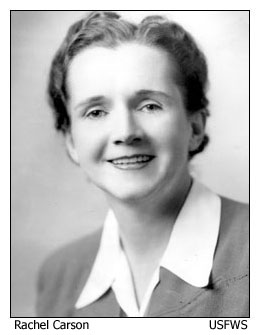 Silent Spring by Rachel Carson, 1962 — “The history of life on earth has been a history of interaction between living things and their surroundings. To a large extent, the physical form and the habits of the earth’s vegetation and its animal life have been molded by the environment. Considering the whole span of earthly time, the opposite effect, in which life actually modifies its surroundings, has been relatively slight. Only within the moment of time represented by the present century has one species—man—acquired significant power to alter the nature of his world.” On DDT and malaria, she said: “No responsible person contends that insect-borne disease should be ignored. The question that has now urgently presented itself is whether it is either wise or responsible to attack the problem by methods that are rapidly making it worse. The world has heard much of the triumphant war against disease through the control of insect vectors of infection, but it has heard little of the other side of the story—the defeats, the short-lived triumphs that now strongly support the alarming view that the insect enemy has been made actually stronger by our efforts. Even worse, we may have destroyed our very means of fighting.” Silent Spring by Rachel Carson, 1962 — “The history of life on earth has been a history of interaction between living things and their surroundings. To a large extent, the physical form and the habits of the earth’s vegetation and its animal life have been molded by the environment. Considering the whole span of earthly time, the opposite effect, in which life actually modifies its surroundings, has been relatively slight. Only within the moment of time represented by the present century has one species—man—acquired significant power to alter the nature of his world.” On DDT and malaria, she said: “No responsible person contends that insect-borne disease should be ignored. The question that has now urgently presented itself is whether it is either wise or responsible to attack the problem by methods that are rapidly making it worse. The world has heard much of the triumphant war against disease through the control of insect vectors of infection, but it has heard little of the other side of the story—the defeats, the short-lived triumphs that now strongly support the alarming view that the insect enemy has been made actually stronger by our efforts. Even worse, we may have destroyed our very means of fighting.” |
| Historical roots of our ecological crisis by Lynn White. Science, 1967. “The greatest spiritual revolutionary in Western history, Saint Francis, proposed what he thought was an alternative Christian view of nature and man’s relation to it; he tried to substitute the idea of the equality of all creatures, including man, for the idea of man’s limitless rule of creation. He failed. Both our present science and our present technology are so tinctured with orthodox Christian arrogance toward nature that no solution for our ecologic crisis can be expected from them alone. Since the roots of our trouble are so largely religious, the remedy must also be essentially religious, whether we call it that or not. We must rethink and refeel our nature and destiny. The profoundly religious, but heretical, sense of the primitive Franciscans for the spiritual autonomy of all parts of nature may point a direction. I propose Francis as a patron saint for ecologists.” Science magazine (155: 1203-1207). |
 The Tragedy of the Commons by Garrett Hardin, Science, 1968. “The tragedy of the commons develops in this way. Picture a pasture open to all. It is to be expected that each herdsman will try to keep as many cattle as possible on the commons. Such an arrangement may work reasonably satisfactorily for centuries because tribal wars, poaching, and disease keep the numbers of both man and beast well below the carrying capacity of the land. Finally, however, comes the day of reckoning, that is, the day when the long-desired goal of social stability becomes a reality. At this point, the inherent logic of the commons remorselessly generates tragedy.” Hardin’s views were challenged in the 1990s by Elinor Ostrom who argued that traditional societies have mechanisms for avoiding the tragedy of the commons. Ostrom won the Nobel prize for economics in 2009. The Tragedy of the Commons by Garrett Hardin, Science, 1968. “The tragedy of the commons develops in this way. Picture a pasture open to all. It is to be expected that each herdsman will try to keep as many cattle as possible on the commons. Such an arrangement may work reasonably satisfactorily for centuries because tribal wars, poaching, and disease keep the numbers of both man and beast well below the carrying capacity of the land. Finally, however, comes the day of reckoning, that is, the day when the long-desired goal of social stability becomes a reality. At this point, the inherent logic of the commons remorselessly generates tragedy.” Hardin’s views were challenged in the 1990s by Elinor Ostrom who argued that traditional societies have mechanisms for avoiding the tragedy of the commons. Ostrom won the Nobel prize for economics in 2009. |
| Pilgrim at Tinker Creek by Annie Dillard, 1974 — “Our life is a faint tracing on the surface of mystery, like the idle curved tunnels of leaf miners on the face of a leaf. We must somehow take a wider view, look at the whole landscape, really see it, and describe what’s going on here. Then we can at least wail the right question into the swaddling band of darkness, or, if it comes to that, choir the proper praise.” |
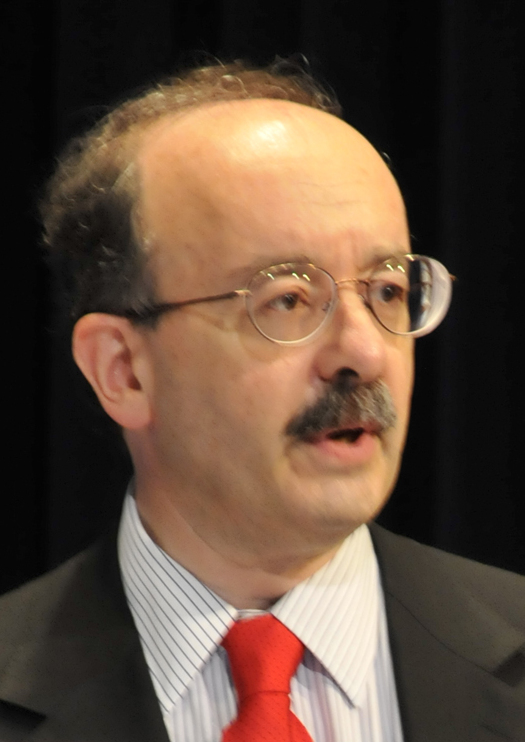
Energy Strategy and the Road Not Taken, by Amory Lovins, Foreign Affairs, 1976. “This paper … (contrasts) two energy paths that the United States might follow over the next 50 years – long enough for the full implications of change to start to emerge. The first path … relies on rapid expansion of centralized high technologies to increase supplies of energy, especially in the form of electricity. The second path combines a prompt and serious commitment to efficient use of energy, rapid development of renewable energy sources matched in scale and in energy quality to end-use needs, and special transitional fossil-fuel technologies. This path, a whole greater than the sum of its parts, diverges radically from incremental past practices to pursue long-term goals… For lack of a more satisfactory term, I shall call (the technologies on this path) “soft” technologies: a textural description, intended to mean not vague, mushy, speculative or ephemeral, but rather flexible, resilient, sustainable and benign…” |
| The End of Nature, by Bill McKibben 1989 — “Nature, we believe, takes forever. It moves with infinite slowness throughout the many periods of its history, whose names we dimly recall from high school biology—the Devonian, the Triassic, the Cretaceous, the Pleistocene.” |
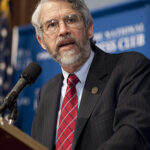 (NASA/Bill Ingalls) Science and Technology for Sustainable Well-Being, by John P. Holdren, Science, 2008. “Science and technology have particularly important roles to play [in] meeting the basic needs of the poor; managing the competition for the land, water, and terrestrial biota of the planet; maintaining the integrity of the oceans; mastering the energy-economy-environment dilemma; and moving toward a nuclear weapon-free world. … Human well-being rests on a foundation of three pillars, the preservation and enhancement of all three of which constitute the core responsibilities of society: 1) Economic conditions and processes, such as production, employment, income, wealth, markets, trade, and the technologies that facilitate all of these;< |
|
Over the 25 years that climate change has been on the world’s agenda, global emissions have risen unchecked while real world impacts have taken hold in earnest. Time is running out. We are already experiencing loss of life and livelihood due to intensified storms, shortage of fresh water, spread of disease, rising food prices, and the creation of climate refugees. The most devastating effects are visited on the poor, those with no involvement in creating the problem. A deep injustice. |
Other lists of classics
- Bill McKibben’s American Earth
- Peter Dykstra’s list of Five Best (and some honorable mentions)
- Sierra Club list of classic books
- Goodreads list of environmental classics
- Ron Meador’s Summer Reading List of 25 environmental classics

